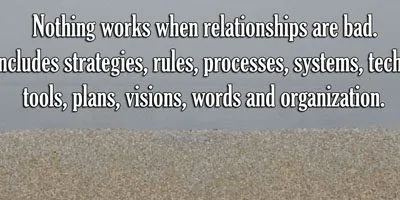Sherlock Holmes Problem Solving Expanding Field Of Vision
Posted on13 Jan 2020
Comments0
Sherlock Holmes sees things that others do not. They aren’t blind. They just rely too much on what they do see. This... Read More
Five Point Scales Misleading You On Predicting Consumer Behaviors?
Five point scales show up everywhere. They often mislead people though. It’s especially true when people use them to make predictions. Predicting... Read More
Change Leadership Sets Two Key Expectations
Posted on01 Jun 2015
Tagschange management, cognitive bias, decisions, expectations, leadership, resistance to change, change management strategy
Comments0
A good change management strategy begins with knowing the group’s culture. The tough part is using that to form a strategy for... Read More
Toxic Soil Analogy: Good Ideas Planted on Bad Relationships
Posted on23 Apr 2012
Tagsfacts, vision, Toxic Soil Analogy, strategy, relationships, rationale, perception, minds, management, leadership, ideas, heartfelt, employees, emotions, diversity, organizational culture, conflict management, conflict, cognitive bias, analogy
Comments7
Imagine soil so toxic that nothing will grow. No matter how good our seeds, our farming techniques and the weather are; nothing... Read More
Eloquence Trumps Honesty in Trust & Likeability Wars
Posted on15 Aug 2011
Tagspolitics, eloquence, free will, Harvard Business Review, honesty, Influence, intuition, like, Michael I. Norton, conscious, sales, subconscious, Todd Rogers, trust, truth, unawareness, understanding, 12 Most, advertising, approaches, cognition, cognitive bias
Comments0
Intuitive approaches often work because we don’t believe they do. Advertising is an excellent example: it influences us because we often believe... Read More
Problems With Asking “Do You Understand?”
Posted on10 Mar 2011
Tagstraining, Techniques, reprimand, problem solving, management, intuition, Influence, employees, emotions, cognitive bias, cognition, assumptions, approaches, action
Comments2
Long ago I sat in on the reprimand of an employee by a manager. The manager concluded his discussion by asking the... Read More





